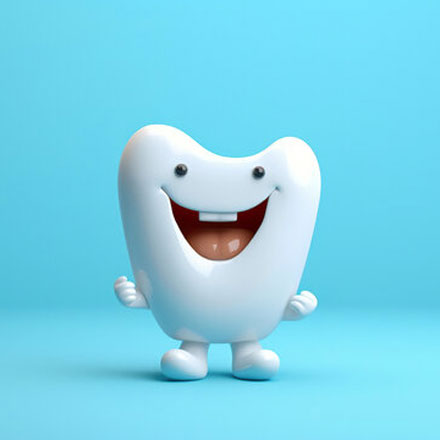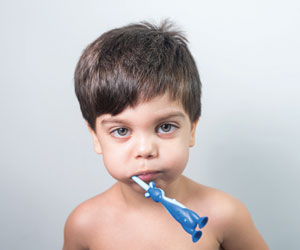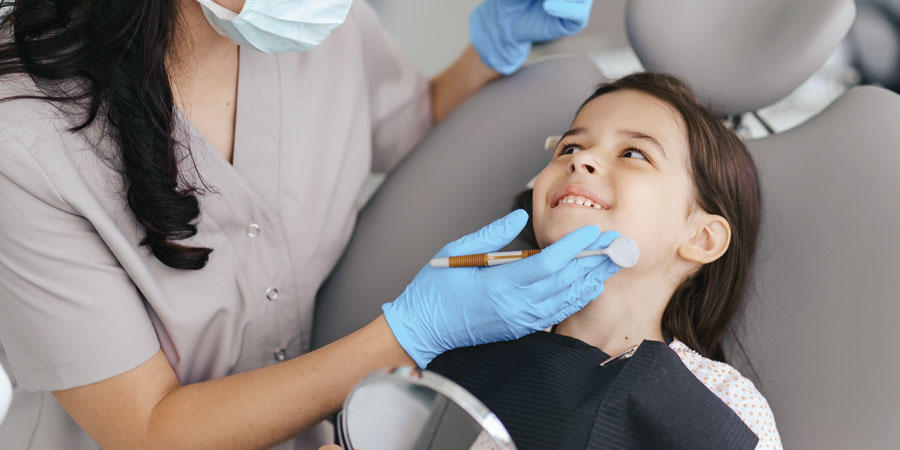Caring for your Child's Teeth
It's critical to maintain your child's baby teeth — or first teeth — healthy. Baby teeth make room for adult teeth. Taking care of your child's teeth will keep them from getting cavities.
- Make your child suffer.
- Make chewing difficult for your toddler.
- As a result, your child will struggle at school.
- Make issues with your child's mature teeth.
Most babies receive their first tooth around the age of six months. Start these healthy behaviours today to ensure that your child's smile remains healthy!
- Before your kid gets any teeth, wipe their gums with a clean towel twice a day.
- Begin brushing your baby's teeth twice a day as soon as they arrive.
- Teach your youngster to clean his or her teeth twice a day.

Tooth decay occurs when bacteria (germs) in our mouths convert sugar from our diet into acid. When these bacteria consume sugar, they produce acid. Acid may develop cavities (holes) in teeth over time.
One of the most frequent paediatric ailments is tooth decay. More than four out of every ten children have decayed baby teeth.
Eating and drinking a lot of sugary foods and drinks increases your child's risk of dental decay. However, healthy behaviours such as brushing and visiting the dentist can help to avoid tooth decay
Brush your child's teeth with a pea-sized quantity of toothpaste beginning at the age of 2 or 3 years.
After brushing, make sure your child spits out the toothpaste; if young children consume too much fluoride toothpaste, their adult teeth may develop white patches.
Children as young as 7 or 8 years old can begin to clean their own teeth. Keep a watch on your children in order to ensure:
- They should all brush their teeth.
- Brush for approximately 2 minutes each time.
- Instead of swallowing the toothpaste, spit it out.

It might be difficult to get children to wash their teeth. Here are some suggestions for making it more fun for them
- Allow your youngster to select a toothbrush in a favourite colour or with a character from a favourite TV programme or movie — just make sure it's the correct size for your child's mouth.
- Find books or shows with brushing storylines, and then utilise the characters as role models for your youngster to clean their own teeth.
- Sing or play a song to assist your youngster wash his or her teeth for 2 minutes.
Make use of fluoride toothpaste. When shopping for toothpaste, check the package to ensure it contains fluoride.
Inquire with your child's doctor about fluoride varnish. When your child's first tooth appears, ask the doctor to apply fluoride varnish (a thin coating of fluoride applied to the teeth). Fluoride varnish aids in the prevention of tooth decay.

Find out if your water contains fluoride. In many towns and cities, fluoride is added to the drinking water. Check to see if the water in your neighbourhood contains fluoride or you may also ask your local water provider. If your water does not contain fluoride, see your doctor or dentist to see if your kid needs fluoride supplements.
Allow your youngster to consume tap water. If your water contains fluoride, offer your youngster tap water rather than bottled water.
Most bottled water has little fluoride to prevent your child's teeth from decay. To guarantee the safety of your tap water, contact your local water supplier.
Give your youngster nutritious foods. Vegetables, fruits, whole grains, dairy, legumes, and lean meats are all examples of healthy foods.
Find out more about healthy eating alternatives for your children.
Make healthful drinks available to your children. If sugar from beverages remains on your child's teeth for an extended period of time, it can cause tooth decay. To assist with tooth decay prevention.
Allow your children to drink just water in between meals. Give your children milk or juice only with meals.